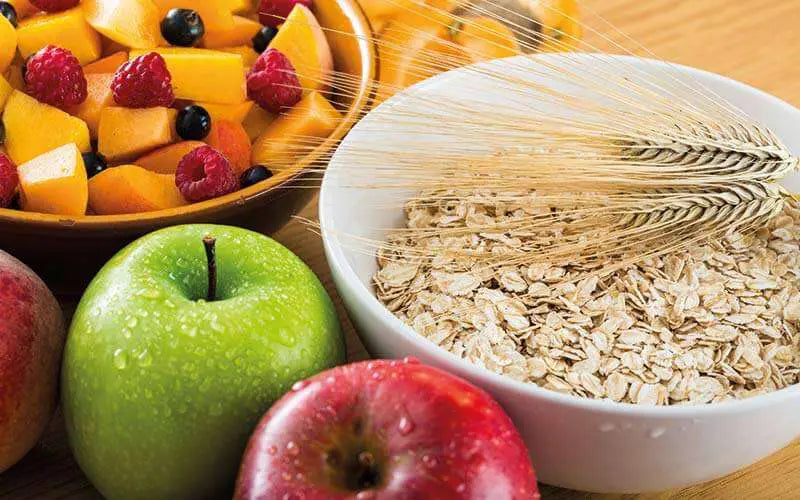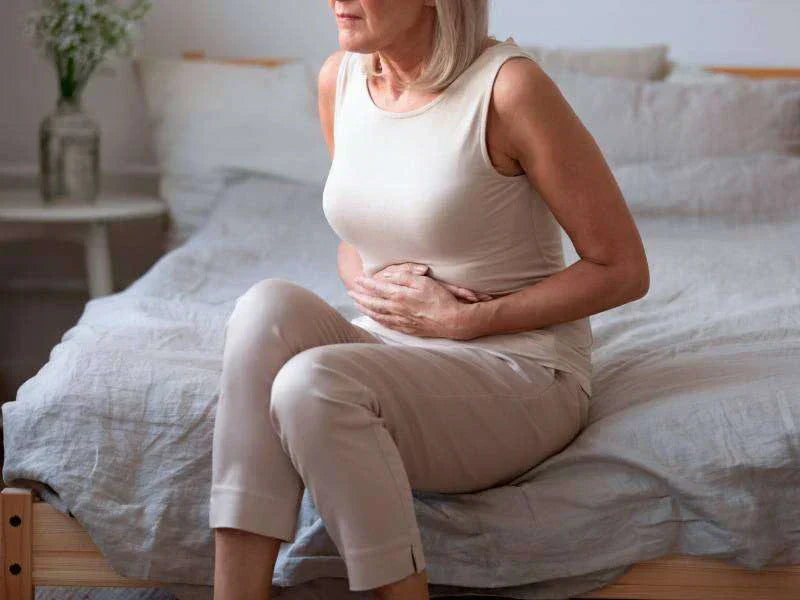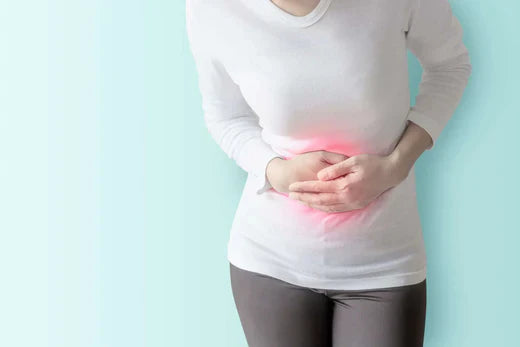Did you know that some scientists have found that eating more fibre improves symptoms of depression? (1) We explain the benefits of fibre before, during and after the menopause.
What is fibre and why is it important in menopause?
Fibre is a component present in various plant-based foods. This compound cannot be absorbed by the body, as digestive enzymes are unable to break it down.
Once consumed, it passes through the entire digestive tract and is eliminated by the body without being absorbed (2). However, during this transit, it helps to regulate intestinal activity. This facilitates the digestion process and the passage of faeces.
It has also been shown to play a key role in maintaining intestinal flora. Therefore, one of the most important benefits of fibre is that it contributes to intestinal health and prevents constipation (2,3).
Why do you need it in the menopause?
Menopause is a time when women's bodies experience significant alterations to the gastrointestinal system and constipation is one of the first manifestations (4).
Hormonal changes can slow down bowel function, so that bowel movements often become more difficult, painful and sporadic. Also, stomach cramps, colitis, worsening symptoms of irritable bowel syndrome and some types of haemorrhoids may occur. In addition, loss of appetite often indirectly complicates constipation (1,4,5).
Due to hormonal disruption (oestrogen deficiency) changes occur in the intestinal flora. These contribute to the above-mentioned intestinal problems. Furthermore, it is suggested that changes in the intestinal flora may also alter the function of the immune and endocrine systems and be related to mood problems or depression (1).
To address gastrointestinal problems associated with the menopause, GP’s may prescribe probiotics and prebiotics. However, this must be accompanied by sufficient fibre intake. Even herbal supplements based on clover tree and Roman anise have been developed to treat the problem (4).

Benefits of fibre before, during and after menopause
Some of the benefits of fibre include (1,2,3,4,5):
- Improve digestion and bowel movements.
- Help treat chronic constipation by softening the stool.
- Contribute to the prevention of gastrointestinal diseases such as haemorrhoids, diverticular disease and colitis.
- Reduce the risk of colon cancer.
- Reduce the risk of heart attack, stroke and type 2 diabetes.
- Enables you to feel satisfied with your meals and, as a result, eat smaller portions.
- Help to reduce the symptoms of depression that often occur before menopause.
- Help regulate the intestinal flora.
Fibre rich foods
Now that you know the benefits of fibre, here is a list of the foods that contain the highest percentage of this component (6):
- Fruits and vegetables: apples, bananas, pears, peaches, plums, tangerines, kiwis, strawberries, figs, artichokes, cabbage and cabbage.
- Legumes: peas, chickpeas, lentils, broad beans and black beans.
- Vegetables: pumpkins, turnips, mushrooms, beets and asparagus.
- Nuts: almonds, sunflower seeds, pistachios and peanuts.
- Cereals: brown rice, oatmeal and bread made with whole wheat flour.
Tips on how to include it in your diet and enjoy the benefits of fibre
One of the main recommendations for menopause is to eat a balanced diet. This includes consuming at least 21 grams of fibre daily. To achieve this, we recommend (7):
- Eat 5 portions of fruit a day.
- Substitute refined flours for wholemeal flours in your recipes.
- Eat potatoes with skins.
- Choose rice, pasta and wholemeal bread.
- Add pulses such as lentils and chickpeas to your salads.
- Include vegetables in all your meals.
- Eat seeds as a snack.
The benefits of fibre are quite extensive. It can help you feel better, have easier bowel movements and reduce the risk of bowel disease. Best of all, it's simple and delicious to include it in your diet. We invite you to follow the tips and make fibre part of your diet!
Bibliographical references
-
Li D, Tong Y, Li Y. Dietary Fiber Is Inversely Associated with Depressive Symptoms in Premenopausal Women. Front Neurosci. 2020 May 6; 14:373. Available from: https://www.ncbi.nlm.nih.gov/pmc/articles/PMC7218088/
-
NHS. Patient information-Fibre [Internet]. [cited 2023 Feb 12] Available from: https://www.wsh.nhs.uk/CMS-Documents/Patient-leaflets/ColorectalandStomaCare/5147-2Fibre.pdf.
-
NHS. How to get more fibre into your diet [Internet]. 2022 Jul 13 [cited 2023 Feb 12]. Available from: https://www.nhs.uk/live-well/eat-well/digestive-health/how-to-get-more-fibre-into-your-diet/
-
Eliasvandi P, Khodaie L, Mohammad Alizadeh Charandabi S, Mirghafourvand M. Effect of an herbal capsule on chronic constipation among menopausal women: A randomized controlled clinical trial. Avicenna J Phytomed. 2019 Dec; 9(6):517-529. Available from: https://www.ncbi.nlm.nih.gov/pmc/articles/PMC6823525/
-
NHS. High fibre diet [Internet]. 2021 [cited 2023 Feb 12]. Available from: https://www.yorkhospitals.nhs.uk/seecmsfile/?id=1895
-
Mayo clinic. Chart of high fibre foods [Internet]. 2021 Jan 5 [cited 2023 Feb 12]. Available from: https://www.mayoclinic.org/healthy-lifestyle/nutrition-and-healthy-eating/in-depth/high-fiber-foods/art-20050948
-
NHS. Basic dietary guidelines for menopause [Internet]. [cited 2023 Feb 12]. Available from: https://www.ardengemcsu.nhs.uk/media/2069/dietary-guidelines-pdf-oct-2020.pdf
You May Also Like

JOIN US AND GET 10% OFF
Sign up to our newsletter to access free resources, advice and support.















